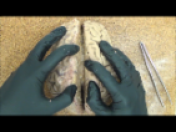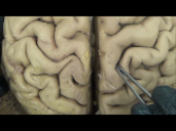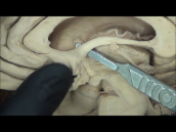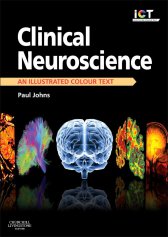
NEUROANATOMY Video Dissection Course (2-day)*
Sat 21st - Sun 22nd September 2024
(Venue: Dissection Room, King's College London, UK)
Highly rated and popular course based around lectures integrated with superb, step-by-step video demonstrations of human brain dissection
* Includes instant access to 8 online preparatory modules
Course Overview
This is exciting course is based around superb video demonstrations of human detailed brain dissection - with live expert commentary
- Based around lectures and step-by-stem brain dissections
- Helps build a solid understanding of brain structure in 3D
- Includes traditional blunt white matter dissection
- All major subcortical white matter pathways explored
- Popular "consolidation sessions" help build confidence
- Includes MRI correlation (axial, sagittal, coronal planes)
Course fee: £395
(with online preparatory materials and practical anatomy sessions)
Course director:
Dr Paul Johns, BSc BM MSc FAcadMEd FRSB FRCPath
Consultant Neuropathologist, Reader in Clinical Neuroanatomy
Mean participant feedback score: 4.9 / 5.0
Read a review
Feedback from UK neurosurgical trainees...
“an excellent course that I will certainly recommend it to my colleagues. The live dissection format is ideal from a neurosurgical perspective as you learn the exact relations of structures in situ
as they are dissected from each other. It would be perfect for trainees in the first few years of training to give them a broad overview of neuroanatomy, and also useful later for revision.”
-Patrick Grover, Neurosurgery ST6, North Thames Deanery Rotation
“an excellent course and I got a great deal out of it. The course covered a lot of ground, it was well delivered and very interactive. Dr Johns step-by-step review of different parts of the brain
using videos of brain dissection helped me gain a much better understanding of the structures. The videos were outstanding! Dr Johns is an expert at teaching neuroanatomy. He is enthusiastic about
teaching, an excellent speaker and very approachable. I would highly recommend this course to other neurosurgical trainees or anyone interested in learning neuroanatomy.” -Kapil Rajwani,
Neurosurgery ST1, Plymouth Hospitals NHS Trust
“At under £300 for a weekend (hence no need to use up study or annual leave) this is a cheap and accessible alternative to a cadaveric course and consists of talks based around HD videos of brain
dissections performed by a neuropathologist, covering all the surface anatomy of the hemispheres, then brainstem, vessels, basal ganglia, white matter tracts and hippocampal region in increasing
detail. It would serve as an excellent primer for ST1-3 trainees or as exam revision for those nearer the end of training." -Zakaria Rashid, Neurosurgery ST4, Mersey Deanery
Course Programme
This exciting neuroanatomy video dissection course is ideal for anyone who wants to improve and consolidate their knowledge of human brain anatomy and build a better three-dimensional
understanding of brain structure.
During the two day lecture programme, focussed anatomical review sessions are paired with numerous high quality video demonstrations of real human brain dissections with live expert commentary.
Includes: surface anatomy of the cerebral hemispheres and limbic lobe; deep cerebral white matter (using traditional "blunt dissection"); dissections of the hippocampus, fornix, ventricles,
basal ganglia, internal capsule and thalamus.
The venue for the weekend workshop will be Lecture Theatre 2, Guy's Campus, King's College London (see venue here).
SATURDAY
09.30 - 10.00: Registration
10.00 - 10.30: Surface anatomy of the brain in the midsagittal plane (diencephalon and topographical cortical anatomy, with MRI correlation)
10.30 - 11.00: Video session, dissection of the limbic lobe
(medial hemispheric surface, cingulate/cingulum bundle and Papez circuit)
11.00 - 11.30: Break
11.30 - 12.00: Surface anatomy of the hemispheric convexity
(gyral and sulcal anatomy of the sensory, motor and language areas)
12.00 - 12.30: Video session, dissection of the perisylvian area / insula (with exposure of basal ganglla, claustrum, extreme/external capsules)
12.30 - 13.30: Lunch break
13.30 - 14.00: Review of major hemispheric white matter pathways (overview of subcortical association, commisural and projection bundles)
14.00 - 14.30: Video session, blunt white matter dissection
(deep dissection of the cerebral hemisphere from the lateral aspect)
14.30 - 15.00 Break
15.00 - 16.00 Neuroanatomy review and consolidation session
(review and 'self-test' using images of brain dissections and MRI scans)
16.00 - 16.15: Questions / comments
SUNDAY
10.00 - 10.30: Dorsal hemispheric surface anatomy and axial sections (focusing on the central region, motor hand area and intraparietal sulcus)
10.30 - 11.00: Video session, transcallosal dissection into ventricles (lateral and third ventricles, diencephalon, fornix and velum interpositum)
11.00 - 11.30: Break
11.30 - 12.00: Anatomy of the superior and medial temporal lobe (review of gross hippocampal anatomy and the fimbria-fornix bundle)
12.00 - 12.30: Video session, dissection of the temporal lobe (anatomical exploration of the hippocampus, fornix and amygdala)
12.30 - 13.30: Lunch break
13.30 - 14.30 Topography of the basal hemispheric surface
(orbitofrontal cortex, inferior occipitotemporal region and brain stem)
14.00 - 14.30: Video session, the posterior fossa contents
(dissection of the brain stem, cerebellum and cerebellar peduncles)
14.30 - 15.00: Break
15.00 - 16.00: Neuroanatomy review and consolidation session
(review and self-test using images of brain dissections and MRI scans)
16.00 - 16.15: Questions / comments -- and Close





















